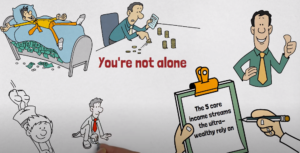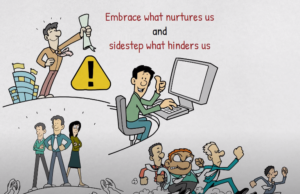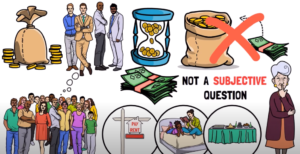Table of Contents
ToggleIntroduction
Have you ever found yourself contemplating the idea of working until the age of 65 or worrying about the possibility of not having enough money once you retire?
Often, individuals are caught in a cycle of working hard without experiencing much financial progress. Picture an unending competition to climb the corporate ladder, earn more money, and maintain a more luxurious lifestyle. This is what we commonly refer to as the rat race.
Many individuals unknowingly find themselves trapped in this cycle, which could lead them to continue working in a corporate job until they reach the age of 65 or even longer.
Breaking free from these habits is crucial to escaping the rat race as soon as possible and working towards a more financially secure future. In this video, we’ll identify these habits so that we can understand and avoid them. Let’s begin with the first habit.
1: Getting Too Comfortable with the Status Quo

It’s easy to settle into a routine and become satisfied with what you have. However, sticking to the same routine and not exploring new paths can hinder both personal and professional growth.
Overcoming this mistake requires maintaining a growth mindset and continuously seeking opportunities to expand your financial capabilities. Life is dynamic, and unexpected desires or responsibilities may arise. This realization should serve as motivation to keep moving forward rather than remaining complacent.
Challenge yourself to do a little more each day than you did before, as this incremental progress will set you on the right path toward financial success.
2: Ignoring the Earn, Save, and Invest Rules

Many individuals fall into the trap of letting their money sit idle. The middle-class dilemma often involves a cycle of earning money and quickly spending it, resulting in minimal financial progress.
The key mistake here is neglecting to save and invest a portion of your income. While saving money is a good start, missing out on investing means passing up the chance to make your money grow. Investing is where the real magic of wealth creation happens.
If you genuinely want your money to grow and become wealthy, you need to consider investing in stocks, properties, government bonds, and similar avenues. This combination of saving and investing can help your money grow significantly over time.
3: Depending Too Much on Loans and Credit Cards
Loans and credit cards can be alluring, acting as double-edged swords. They provide immediate gratification, allowing you to buy what you want when you want. However, this comes at a cost that can trap many individuals in a web of debt.
Using credit cards for everything is like using a Band-Aid for every problem—it might cover the issue temporarily but won’t prevent a financial injury from worsening. It’s crucial to learn to rely on your own money rather than borrowing at high costs.
This mistake can keep you spinning in the middle-class cycle, hindered by debt, and unable to progress financially.
4: Saying Yes Whenever People Ask for Money

It can be challenging to say no when friends or family ask for money, especially when they’re facing financial challenges. There is often a sense of obligation to help, even if it’s a small amount, and even if we’re unsure if we’ll get the money back.
Learning how to say no is important. The more we say no, the easier it becomes, and fewer people may come asking for money. Of course, there are situations where we can’t ignore someone in genuine need, especially in emergencies.
However, it’s important to understand when to say no. Only lend an amount that you’re comfortable with, meaning it doesn’t significantly impact you whether you get it back or not. This way, you can strike a balance between helping others and safeguarding your own financial well-being.
5: Overspending on Home and Becoming House Poor
Overspending on a home is a common financial trap that can lead to serious consequences. Many people are tempted to buy a larger, fancier house than they can afford, believing it will bring them happiness and social status.
However, this kind of overspending can result in long-term financial problems, including mortgage debt, higher utility bills, and maintenance costs.
Financial Consequences
The key issue with overspending on a home is that it can make you house poor, meaning all your income goes toward housing expenses, leaving little room to invest for your future.
This financial vulnerability can make it challenging to handle unexpected expenses or emergencies and can hinder your ability to achieve financial stability.
Avoiding the Trap
To avoid overspending on a home, it’s crucial to budget for housing expenses and consider all associated costs like property taxes, insurance, and maintenance. Exploring alternative options, such as renting, can provide flexibility and freedom, especially for those looking to become financially secure.
By steering clear of the trap of overspending on a home early, you can take control of your finances and build a more secure financial future.
6: Choosing the Right Partner

Choosing the right partner can significantly impact your financial well-being. This trap can lead to financial problems in various ways, such as disagreements and strain on your relationship if there are differences in financial habits and attitudes.
Financial harmony in relationships
Being on the same page financially is crucial for any relationship. Open communication about finances and financial goals from the beginning is essential. When choosing a partner, consider their financial habits, attitudes, and goals.
Setting financial boundaries and establishing a joint budget can help you and your partner work together towards achieving financial stability and reaching your shared goals.
7: Overspending on education

Overspending on education is a significant concern for middle-class families. While education is often seen as the key to upward mobility, there’s a delicate balance between investing wisely and facing financial strain.
Balancing education costs
The challenge lies in finding the right balance where you invest wisely in education without compromising your financial health. Student loans play a crucial role in this discussion, providing access to education but also carrying the risk of a lifetime of debt.
Emphasizing the importance of considering the return on investment is key to making wise decisions about education spending and avoiding the common middle-class trap.
8: Not Asking Yourself the Most Important Question?
The habit of not asking yourself the most important question can lead to dissatisfaction in your career. If you had money, would you still work where you’re working now? If the answer is no, it’s time to consider what you would rather be doing.
Aligning passion with career
Money should not be the sole motivation for choosing a job. Time is a valuable resource, and it’s crucial to choose projects and professions that genuinely interest you. Pursue what you love, as success often follows passion.
Make wise decisions about your career, and remember that success often follows passion. Dare to dream, work towards your goals, and watch your dedication transform your life into one of abundance and fulfillment.
Conclusion
In conclusion, breaking free from the rat race requires careful consideration of financial choices. Whether it’s avoiding the trap of overspending on a home, choosing the right partner, balancing education costs, or asking yourself the most important question, taking charge of your financial destiny is crucial.
Pursue a life rich in both wealth and happiness by aligning your choices with your passions and goals. Success often follows passion, so dare to dream and work towards a fulfilling life.








